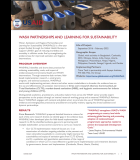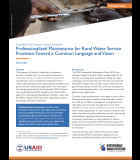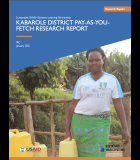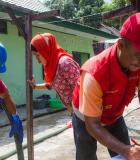Strengthening Decentralization for Sustainability (SDS)
The SDS Program encompassed four core objectives to improve sustainability of decentralized service delivery by the Government of Uganda. Through its objectives, SDS worked to improve the capabilities of district local governments, so that district leaders may take the lead in coordinating the activities of donor support in their district, starting with USAID social sector programs. SDS also improved local government management through technical assistance in planning, budgeting, human resources management, leadership and governance, monitoring and evaluation, management information systems, and financial management and procurement. By providing grants to complement existing resources, SDS supported effective and efficient management of programs at 50 partner districts. Throughout its interventions, SDS encouraged and rewarded local governments that have practical plans for innovative and sustainable approaches to managing and financing social sector programs. SDS realized its objectives by implementing an array of targeted, cross-cutting activities, which provide coordination, technical assistance, grants and innovation support to local governments.
Activity Description
The Water Sanitation and Hygiene (WASH) project was a one year intervention (Apr 2014 - Mar 2015) in which USAID Strengthening Dentralization for Sustainability (SDS) Program supported the improvement of access to safe water, sanitation and hygiene practices in selected schools and health centers. Access to safe clean water, adequate sanitation and proper hygiene are critical in preventing most hygiene-related and communicable diseases. WASH activities included improving household sanitation through Community Led Total Sanitation (CLTS), promoting Menstrual Hygiene Management (MTS) in selected schools, reviewing of WASH Information, Education and Communication (IEC) materials to promote behaviour change, rehabilitating WASH infrastructure and strengthening an enabling environment through the promotion of water governance and advocacy. WASH Project activities were implemented in the districts of Kabale, Kisoro and Kanungu in South-western Uganda in 33 selected schools and 24 health centers.
Actual Outcomes
- 315 district officials and village health teams trained on Community Led Total Sanitation methodologies
- 150 district officials and teachers trained on menstrual hygiene management
- 60 school health clubs rejuvenated to promote proper hygiene practices
- 53 villages certified as open-defecation free
- 50 hand washing facilities supplied to Kisoro district health facilities
- 27 roof rainwater systems constructed
- 22 VIP latrines constructed





